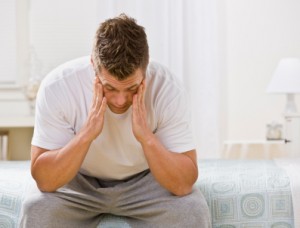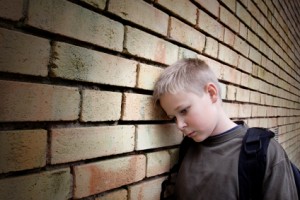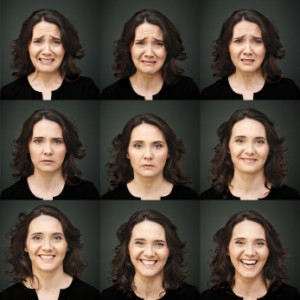Symptoms of Depression
Anyone who either suspects him or herself of having clinical depression or believes a family member or loved one has this mood disorder should consider the following symptoms of depression:
* People who act irritable, agitated, or restless may have clinical depression.
* A dramatic change in appetite can be another indication of depression and is often accompanied by dramatic weight loss or weight gain.
* Clinical depression causes a decrease in the ability to concentrate or make decisions.
* Fatigue and lethargy are also signs of depression.
* Feelings of hopelessness or helplessness often accompany clinical depression.
* People with depression may also experience feelings of self-hate, guilt, and worthlessness.
* Those with depression often withdraw from friends and family and isolate themselves from the world as much as possible.
* Depression often leads to a decrease in pleasurable activities, including sex.
* Thoughts or conversations about suicide and death can be warning signs of depression.
* Various sleeping troubles such as insomnia, excessive sleeping, and early waking often accompany depression.
* Persistent chronic pain such as cramps, headaches, and digestive problems that do not respond positively to treatment may be harbingers of depression.
* Those who often feel anxious, sad, or empty may have depression.
* Depression may cause suicide attempts or thoughts of suicide.
* Delusions and hallucinations can accompany depression (although some of this may stem from medicines taken by patients).
* Those who have difficulty making eye contact may be depressed.
* Pacing, hand-wringing, and pulling on hair are other depression red flags.
* Pyschomotor retardation which manifests in sighs, slow speech, and pauses can be a symptom of depression.
* Slowed body motion and catatonia may also indicate depression.
* A tearful or sad expression can be a sign of depression.
* Negative reactions to stressful life events can signal depression.
In addition to general depression symptoms, men, women, children, teenagers, and the elderly can manifest different or more potent symptoms of depression.
 Symptoms of depression in men include:
Symptoms of depression in men include:
* Modern society’s “tough guy” mentality can lead to men dealing with depression through increased aggressive behavior and irritability.
* Men lose interest in sexual activities and experience embarrassing poor performances in bed.
* Men often exhibit an increase in alcoholism, risky behavior, and drug abuse when depressed.
* Extreme hostility and anger can be signs of male depression.
Click here for a more detailed list of depression symptoms in men.
Symptoms of depression in women include:
* Depression in women is more likely to be triggered by traumatic events or seasonal changes.
* Women more often experience guilty thoughts and contemplate suicide than men, but women do go through with suicide nearly as often.
* Depression bouts often last longer with women than with men.
* Women are more likely than men to exhibit emotional signs of depression such as excessive crying and sadness.
Click here for a more detailed list of depression symptoms in women.
Symptoms of depression in children include:
* Depressed children often withdraw socially and are more sensitive to social rejection.
* Children with depression often experience drastic alterations to sleeping and eating schedules.
* Vocal outbursts and crying often accompany childhood depression.
* Depressed children can experience an increased inability to interact with friends, family, and schoolmates.
To find out more about depression in children, click here.
Symptoms of depression in teenagers include:
* Depressed teenagers often exhibit such irresponsible behaviors as being late for class and skipping school.
* Increased use of alcohol and drugs as well as sexual promiscuity can be signs of teen depression.
* A sudden drop in grades as well as social interaction can indicate depression.
* Difficulty concentrating and making decisions can be warning signs of this condition in teens.
For more information on teenage depression, click here.
Symptoms of depression in the elderly include:
* Older people in a depressed state are more likely to commit suicide.
* It is often misdiagnosed because the symptoms are often masked by other afflictions.
* Increased forgetfulness and slowness of movement are signs of elderly depression.
* Depression in the elderly lasts longer than it does in other age groups.
To find out more about depression in the elderly click here.
Symptoms of suicide include:
* Always talking about death, suicide, and hopelessness are symptoms of suicide.
* Putting affairs in order, changing a will, or saying goodbye to people are red flags.
* Those contemplating suicide often engage in risky, life-threatening behavior.
* As counterintuitive as it may seem, a sudden mood swing from sad and agitated to happy and calm could be an indicator that someone has decided to end his or her life.
If you are considering suicide, get help immediately. Call the Suicide Hotline at 1-800-273-TALK (8255). A trained counselor is available 24/7 to assist you.
Understanding depression is of critical importance. The depressive condition can rob people of quality of life, impeding their ability to healthily interact with family members, friends, and coworkers. It can lead to an increase in chronic pain and a decrease in pleasurable activities. It interferes with sleep patterns, taking away a person’s ability to get a good night’s sleep. It weakens the immune system, leaving the body open to disease and infection. Those who suffer from depression might make poor decisions and take reckless chances; in some extreme cases, those who suffer from certain types of this disorder may commit suicide.
For more information about suicide hotlines please visit our depression hotline page.
Types of Depression
There are several different types of depression, and each one has different symptoms.
Clinical depression is the mood disorder of which most people think when they define depression. It is classified by feelings of hopelessness, helplessness, worthlessness, and pessimism and often leads to chronic pain, fatigue, and, in extreme cases, suicide. Impaired sleeping, cognitive, and pleasure-experiencing abilities result from a clinical depressive state.
 Bipolar disorder –or manic depression— is characterized by rapid mood swings that can leave a person feeling elated one moment and sad the next. The inability to correctly perceive, think, and function socially also occurs with bipolar disorder. Those in an extreme manic depressive downswing should be monitored for suicidal tendencies.
Bipolar disorder –or manic depression— is characterized by rapid mood swings that can leave a person feeling elated one moment and sad the next. The inability to correctly perceive, think, and function socially also occurs with bipolar disorder. Those in an extreme manic depressive downswing should be monitored for suicidal tendencies.
Seasonal Affective Disorder (SAD) often takes place in the fall through winter months. Doctors believe SAD is caused by a lack of serotonin in the brain due to the reduction of sunlight exposure one gets during the fall and winter. SAD victims often suffer from a decrease in energy and concentration as well as an increase in appetite, sleep, and desire for solitude.
Postpartum depression occurs in the first few months after childbirth, miscarriage, or stillbirth. Patients often feel worthless and depressed, which interferes with their ability to bond with their babies. In some rare cases, women can suffer hallucinations and can harm themselves and their babies.
Chronic depression — or Dysthymia –is a less severe form of depression that consists of a general sad and low mood every day over a period of years. People with chronic depression tend to feel pessimistic about their lives, relationships, and futures and find problems more difficult to solve. If not treated, chronic depression can lead to a major depression event referred to as double depression.
Psychotic depression victims often suffer from hallucinations, delusions, and irrational ideas. They are often paranoid and may hear voices in their heads; they may anger quickly or isolate themselves from everyone. This type of depression can be hard to diagnose because its victims are often aware of their psychosis and are ashamed.
Atypical depression is, in spite of its moniker, fairly common. Victims traditionally have fewer symptoms than the five necessary for clinical depression and may experience a mood boost when something positive happens. Increased sleep, appetite, and weight gains along with an increased sensitivity to rejection classify this type.
 Treatment is Available
Treatment is Available
Regardless of what type of depression a person has, treatment is available and can help. The most common treatments are antidepressants and psychological therapy. Left untreated, depression can lead to heart disease and other illnesses. There is also an increased risk of suicide.
Information about Depression
The United States of America has the world’s highest depression lifetime expectancy rate with approximately 17% of all Americans being likely to experience clinical depression at some point. In any given year 3-5% of all American males and 8-10% of American females will experience a depressive bout. The most likely age range in which to get depression is between 20-40 years of age, and about 6.7% of people over the age of 18 have depression.
Depression is an Illness
While being diagnosed with clinical depression still has a stigma in some social circles as more information about this condition has become available most people recognize that it is an illness much like any other. For most people having and dealing with depression is nothing to feel shame about. It is an illness and like any illness recognizing and addressing the symptoms of depression is important.
If you or a loved one has the symptoms listed above please contact your doctor or medical health care professional immediately for an appointment. Treatment is available and it can help.
Related Posts



